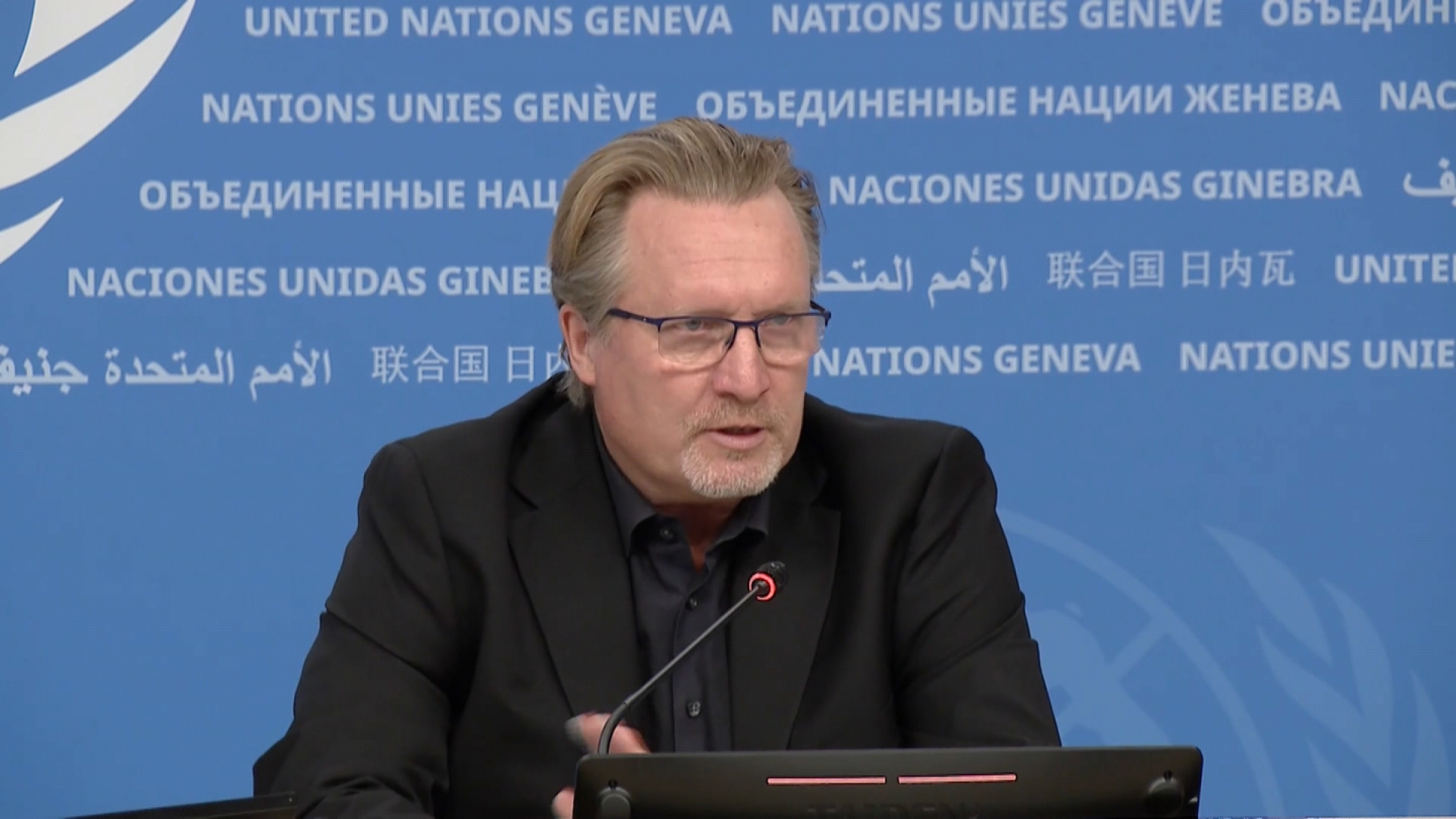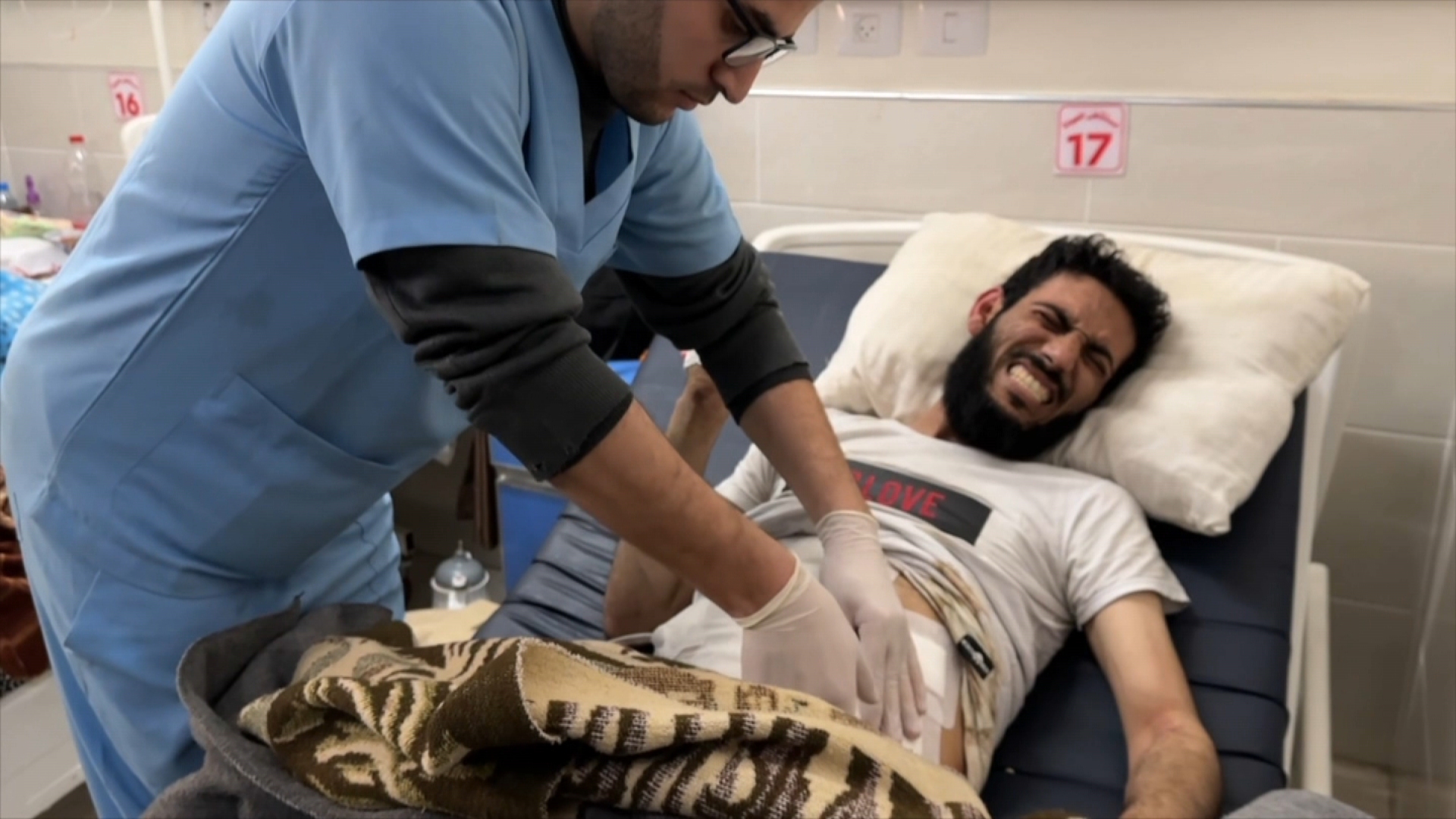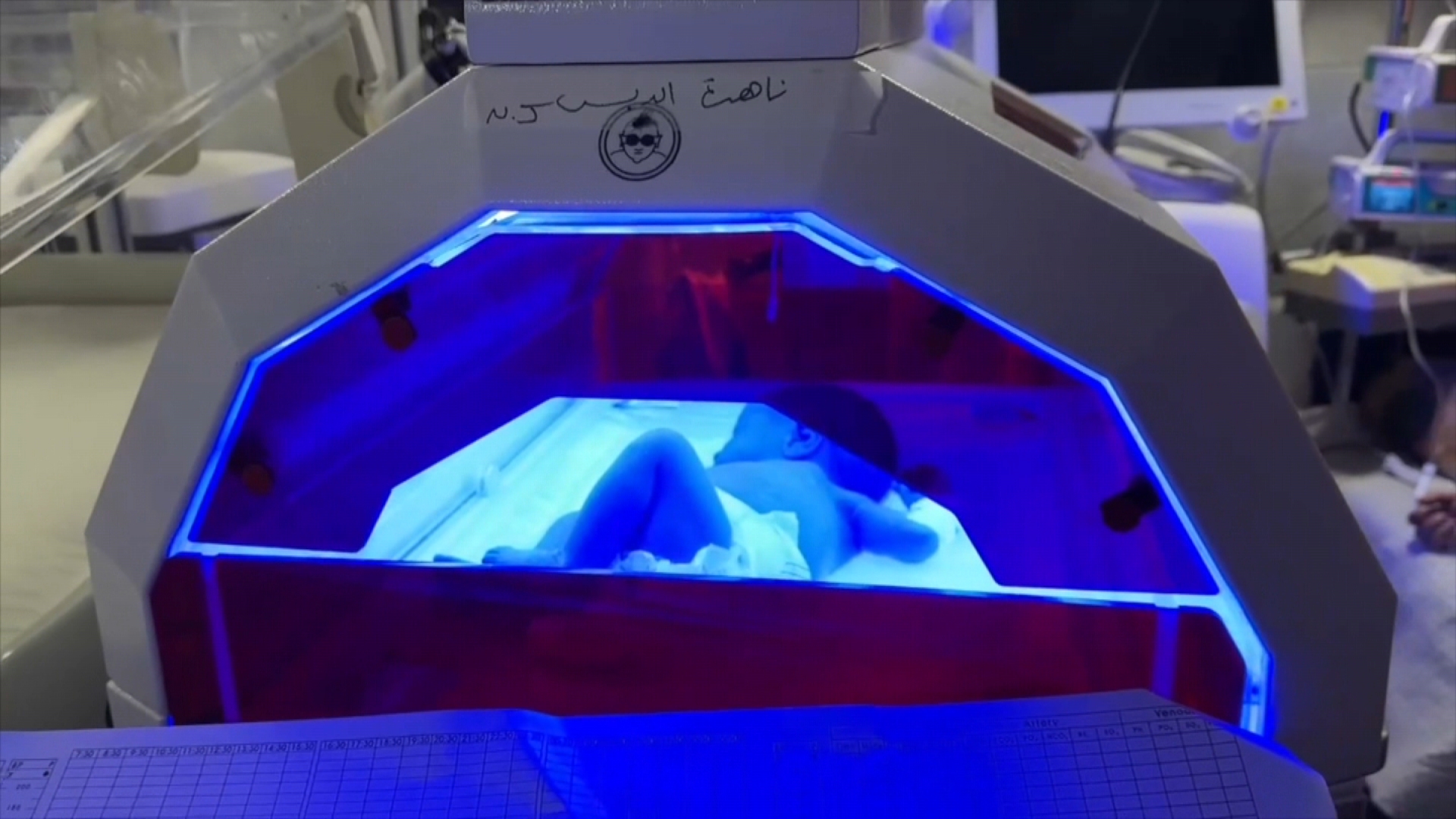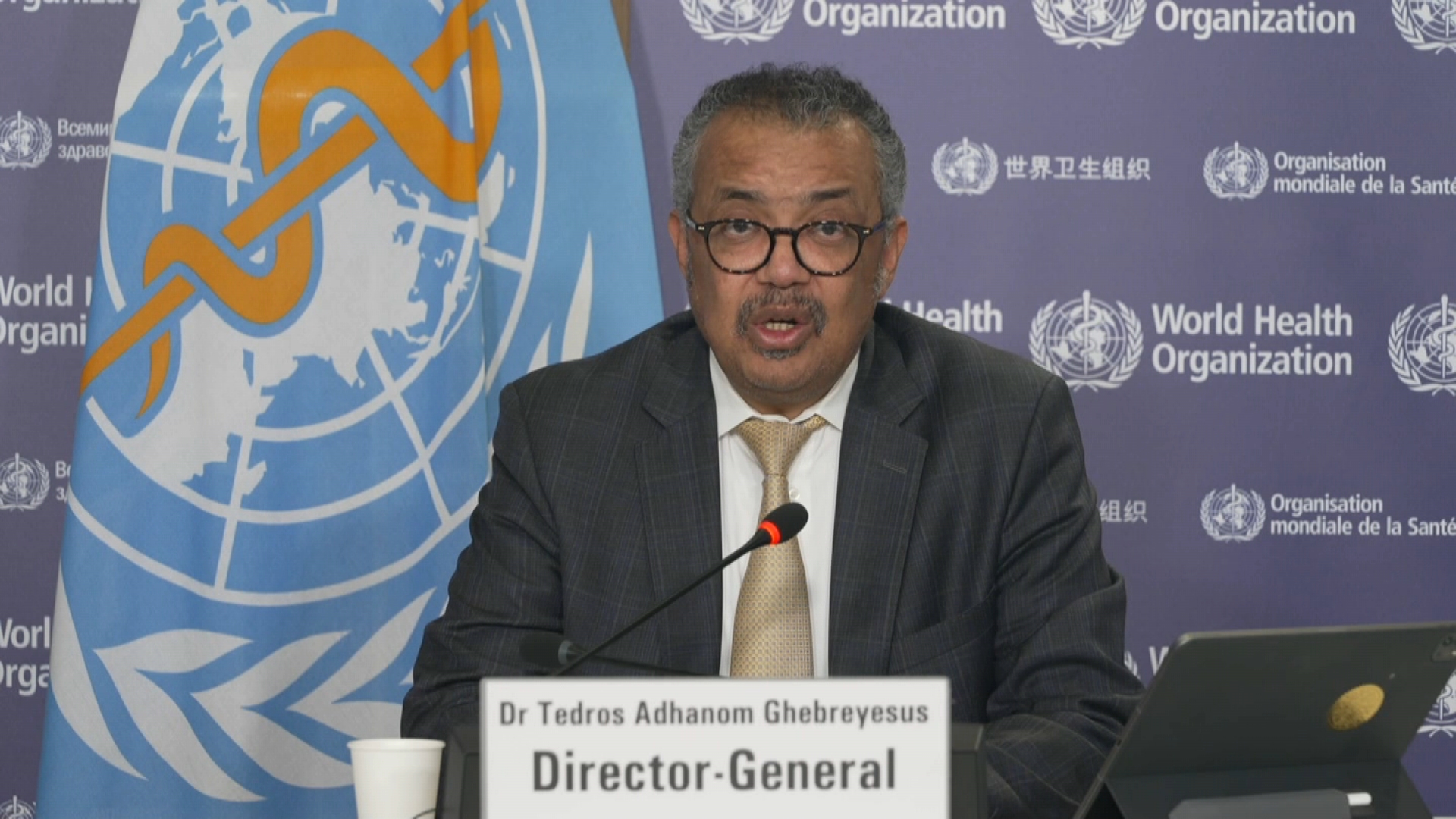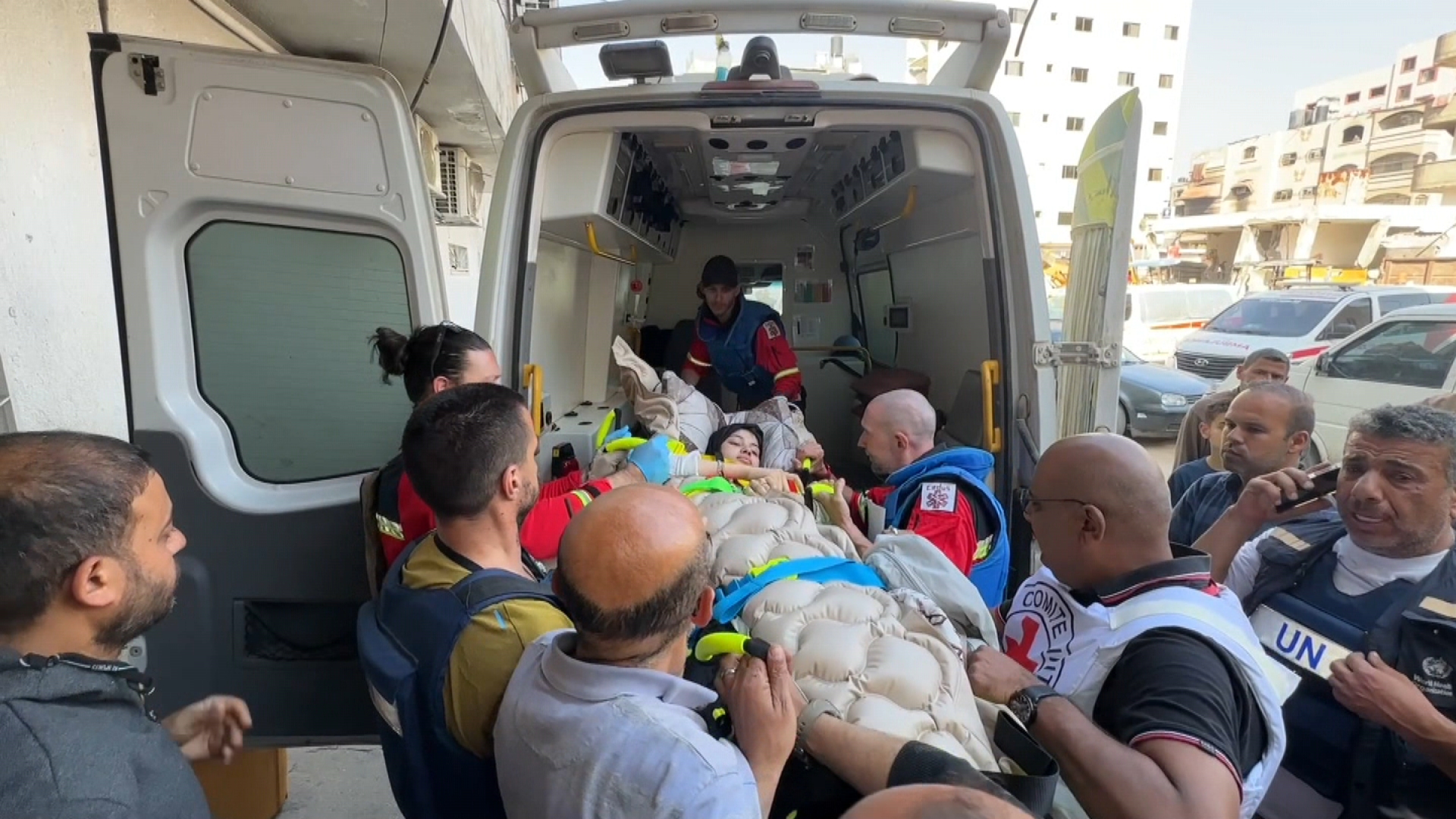WHO / GAZA KAMAL ADWAN HOSPITAL
STORY: WHO / GAZA KAMAL ADWAN HOSPITAL
TRT: 10:31
SOURCE: WHO
RESTRICTIONS: PLEASE CREDIT WHO ON SCREEN
LANGUAGE: ARABIC / ENGLISH / NATS
DATELINE: 18 MARCH 2024, GAZA
18 MARCH 2024, KAMAL ADWAN HOSPITAL, NORTH GAZA
1. Various shots, WHO mission convoy arriving and offloading medical supplies from convoy vehicles
2. SOUNDBITE (Arabic) Dr Hossam Abu Safiya, Director, Kamal Adwan Hospital (Arabic):
“In light of the famine sweeping through all the homes of citizens in the northern Gaza Strip, there’s an increase in the number of children coming to Kamal Adwan Hospital who are suffering advanced dehydration and malnutrition. Malnutrition is common now that our reception department are basically screening the incoming children for malnutrition cases and admitting them to the children’s department. We are receiving more than fifty malnutrition cases a day.”
3. Various shots, WHO mission team in discussion with health workers, talking to patients, parents
4. SOUNDBITE (Arabic) Shaima, Fadi’s mother:
“Fadi has a disease called cystic fibrosis, this disease requires a lot of care, we should be careful with his milk, treatment, food, but we have been at war for 5 months now, nothing is available anymore. Therefore, Fadi’s condition worsened. Day by day, the child’s condition deteriorated. Until it reached the point of dehydration.”
5. Various shots, Fadi on hospital bed, showing signs of severe acute malnutrition
6. SOUNDBITE (Arabic) Shaima, Fadi’s mother:
“Fadi was a joyful boy. He liked to play, he moved a lot and went back and forth to his kindergarten, played with his friends, and family. But for two and half months, Fadi’s condition has worsened, he couldn’t walk, stand, or sit; he lost his balance completely.”
7. Various shots, Fadi, his mother, health worker
8. SOUNDBITE (Arabic) Shaima, Fadi’s mother:
“I am too scared for him now, every time I look at Fadi I feel sad. He was that joyful boy who used to play around and have fun, and now his condition is not getting any better anytime soon. I am truly too scared for Fadi.”
9. Tilt shot, photo of Fadi on his mother’s phone, Fadi on hospital bed
10. SOUNDBITE (Arabic) Dr Hossam Abu Safiya, Director, Kamal Adwan Hospital (Arabic):
“When Fadi arrived at the hospital, he arrived at an advanced stage and the situation was very serious. In addition to that, there was an acute infection, and this is closely related to malnutrition, so instead of him receiving the required treatments, that unfortunately, we cannot provide him, for example, with healthy meals, which means that Fadi’s condition is exacerbated. It may, God forbid, lead to future complications. Fadi's situation is like that of other children, if not a relief for this situation, and we expect more cases like Fadi's in the coming days at Kamal Adwan Hospital.”
11. Med shot, WHO staff offloading medical supplies from convoy vehicles
12. SOUNDBITE (English) Dr Ahmed Dhair, Team Lead, Gaza sub-office, World Health Organization (WHO):
“This hospital, for the past couple of weeks are seeing a high number of severe acute malnutrition with complications, unfortunately. Today, myself I saw 6 children with severe acute malnutrition with complications. WHO and MedGlobal are here today to start supporting and setting up a stabilisation and nutrition centres.”
13. Med shot, WHO staff offloading medical supplies from convoy vehicles
14. SOUNDBITE (Arabic) Dr Hossam Abu Safiya, Director, Kamal Adwan Hospital (Arabic):
“We thank WHO and UNICEF for developing a program to care for these children. Of course they provided us with some aid, meaning that, God willing, it will help these patients, but frankly, this amount that was provided is not enough, and we hope that more quantities will be necessary to treat malnutrition in these children. Of course, malnutrition affects not only children but also adults, and this reflects negatively on workers.”
18 MARCH 2024, AL-AWDA HOSPITAL, NORTH GAZA
15. Various shots, WHO mission team in discussion with health workers and services currently being provided
16. SOUNDBITE (Arabic) Asmahan Hassan Atta Al-Mawajha:
“Our children are tired, yesterday I took my eleven-year-old son to have his blood tested and the result came and his blood count is 11? How’s that possible, that’s very low and weak but what can we do, there’s no eggs no meat no protein, no fish no vegetables either.”
16.Various shots, Mohamad’s injuries
17. SOUNDBITE (Arabic) Asmahan Hassan Atta Al-Mawajha:
“What do I feed him these days? I feed him falafel, Zaatar, tomatoes, and bread.”
18. Various shots, Mohamad being helped to drink
19. SOUNDBITE (Arabic) Asmahan Hassan Atta Al-Mawajha:
“That’s not enough for him, and it’s also unhealthy and won’t help his bones grow. He needs eggs, milk, and calcium.”
20. Various shots showing, hospital ‘s damage
21. SOUNDBITE (Arabic) Unnamed Doc, Al Awda Hospital:
“What the northern Gaza Strip suffers from, especially the health system in the northern Gaza Strip, is food shortages, and this affects the health of patients and the health of the patients’ families. Lack of food and the lack of availability of certain types of food affect the patient, as wounds do not heal in patients, which affects his life and poses a serious risk to his life. Food shortages also affect the small target group that needs proper nutrition, such as children, women, breastfeeding women, and children who need a specific type of food, a specific type of milk, and a specific type of medicine. “
22. Various shots showing, hospital ‘s damage
The latest analysis from the Integrated Food Security Phase Classification (IPC) partnership warned that the situation in Gaza is catastrophic, with northern Gaza facing imminent famine and the rest of the Strip at risk as well.
Before the recent months’ hostilities, 0.8 percent of children under 5 years of age were acutely malnourished.
As of February in the northern governorates, that figure is between 12.4 and 16.5 percent.
Without a significant and immediate increase in deliveries of food, water and other essential supplies, conditions will continue deteriorating.
Virtually all households are already skipping meals every day and adults are reducing their meals so that children can eat.
The current situation will have long-term effects on the lives and health of thousands.
Right now, children are dying from the combined effects of malnutrition and disease. Malnutrition makes people more vulnerable to getting severely ill, experiencing slow recovery, or dying when they are infected with a disease.
The long-term effects of malnutrition, low consumption of nutrient-rich foods, repeated infections, and lack of hygiene and sanitation services slow children’s overall growth.
This compromises the health and well-being of an entire future generation.
WHO and partners have been carrying out high-risk missions to deliver medicines, fuel and food for health workers and their patients, but our requests to deliver supplies are often blocked or refused.
Damaged roads and continuous fighting, including in and close to hospitals, mean deliveries are few and slow.
The IPC report confirms what we, WHO’s UN partners and nongovernmental organizations (NGOs) have been witnessing and reporting for months.
When WHO’s missions reach hospitals, they meet exhausted and hungry health workers who ask us for food and water.
They see patients trying to recover from life-saving surgeries and losses of limbs, or sick with cancer or diabetes, mothers who have just given birth, or newborn babies, all suffering from hunger and the diseases that stalk it.
WHO, as a partner of the Nutrition Cluster, is currently supporting a nutrition stabilization center in Rafah to treat children with severe acute malnutrition with medical complications, who are at the highest risk of imminent death if not urgently treated.
WHO is supporting the establishment of two additional centres: one in the north of Gaza at Kamal Adwan hospital and one at the International Medical Corps field hospital in Rafah.
WHO is supporting the pediatric wards of Al-Aqsa and Al-Najjar hospitals through the provision of nutrition supplies and medicines as well as training of medical personnel, and the promotion of appropriate infant and young child feeding practices, including breastfeeding.
WHO has trained health workers on how to recognize and treat malnutrition with complications.
WHO is supporting hospitals and the centers with medical supplies for the children being treated.
Further nutrition and stabilization centres need to be added in all key hospitals in Gaza.
Communities themselves will need the support to scale up the management of malnutrition locally.
WHO and other UN partners again ask Israel to open more crossings and accelerate the entry and delivery of water, food, medical supplies and other humanitarian aid into and within Gaza.
As the occupying force, it is their responsibility under international law to allow for the passage of supplies including food.
According to WHO, recent efforts to deliver by air and sea are welcome, but only the expansion of land-crossings will enable large-scale deliveries to prevent famine.
The Integrated Food Security Phase Classification (IPC) is a multi-partner initiative for improving food security and nutrition analysis and decision-making.
By using the IPC classification and analytical approach, governments, UN Agencies, NGOs, civil society and other relevant actors, work together to determine the severity and magnitude of acute and chronic food insecurity, and acute malnutrition situations in a country, according to internationally recognized standards.
As a member of the IPC partnership, WHO provided technical expertise and information on the health situation for this evaluation.
The conflict is posing extreme limitations to the ability to deliver life-saving health assistance to the population.
In February 2024, attacks against health-care facilities, infrastructures and services continued, resulting in 58 percent of the hospitals not functioning in Gaza, especially in the Northern governorates (75 percent of the hospitals not functioning).
According to the Health Cluster, as of 5 March 2024, only 2 hospitals and no Primary Health Care Centres were fully functioning.
Acute respiratory infections and diarrheal diseases are rampant among children under five, exposing them to high-risk nutritional deterioration.

